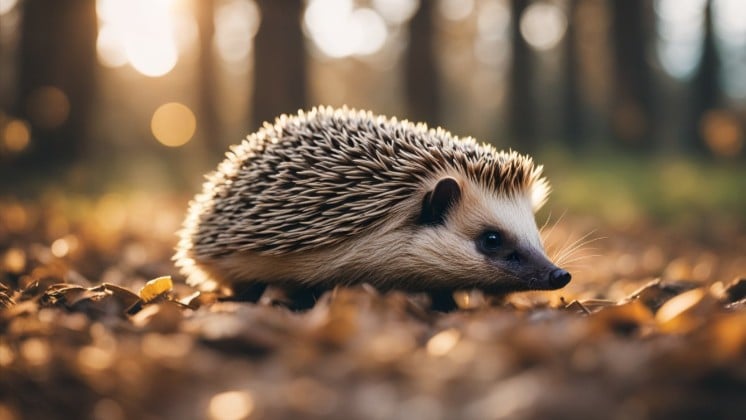Do you have a guinea pig that is constantly biting and attacking? If so, you are not alone. These little rodents can be quite aggressive, especially when they are housed together. So, why are guinea pigs aggressive?
As a general rule, guinea pigs are not aggressive animals. In fact, they are usually quite docile and easy to handle. However, the most common reason for aggression in these animals is overcrowding.
When guinea pigs are kept in too small of an enclosure, they can become stressed and anxious, which can lead to aggression. If you have more than one guinea pig, it is important to make sure they have enough space to run and hide.
That’s just the basic answer. In this article, we will explore the seven most common reasons why guinea pigs become aggressive. We will also provide solutions to help curb these behaviors.
Let’s get started!
Why do guinea pigs suddenly become aggressive?
There are a number of reasons why guinea pigs might be aggressive, including lack of socialization, fear, poor nutrition, and illness. Sometimes, aggression in guinea pigs is hormonal. Unneutered males, for example, are more likely to be aggressive than neutered males.
This can also happen when guinea pigs are ‘stressed out from being kept in a small space or not being allowed to exercise enough.
In fact, guinea pigs are very sensitive to their environment and can become stressed easily, so it’s important to try to create a calm and relaxing environment for them.
Let’s look at the seven most common reasons for aggression in guinea pigs and what you can do to solve the problem.
1. Lack of Socialization
One of the most common reasons for aggression in guinea pigs is lack of socialization. If your guinea pig has not been properly socialized, he may be aggressive when he meets new people or animals.
To socialize your guinea pig, start by handling him regularly. Let him get used to your scent and your touch. You can also try taking him for walks in a secure area, like a fenced-in yard.
If you have other pets, introduce them to your guinea pig slowly and under supervision. Once your guinea pig is socialized, he will be less likely to be aggressive when he meets new people or animals.
2. Fear
Fear is another common reason for aggression in guinea pigs. These animals are prey animals, so they are naturally fearful of predators.
If your guinea pig feels like he is in danger, he may become aggressive in order to protect himself.
3. Fighting to establish dominance over the herd
Guinea pigs are social animals and live in herds in the wild. When they are kept together in captivity, they will establish a hierarchy within the herd.
The most dominant guinea pig will be the leader of the herd, while the others will follow. This hierarchy can sometimes lead to aggression as the guinea pigs fight for dominance.
If you have more than one guinea pig, it is important to make sure they have enough space to establish their own hierarchy. Moreover, keeping equal numbers of males and females can help reduce aggression.
4. Fighting over food or water
Guinea pigs are also known to be food aggressive, meaning they can become aggressive when they are eating. This is usually seen when there is not enough food or water available, and the guinea pigs are fighting over these resources.
To solve this problem, make sure you are providing enough food and water. If your guinea pigs are fighting over food or water, make sure to provide them with enough resources.
Note: Anytime you see guinea pigs fighting, you should never put your bare hand to break them up. Instead, use a towel or other object to startle them and break up the fight.
You can also try feeding them in separate bowls to avoid competition.
I know it might be logical for some people this part, but you’ll be surprised how many skip this part.
5. Hormonal changes
Hormonal changes can also lead to aggression in guinea pigs. This behavior is most commonly seen in unneutered males, as they are more likely to be aggressive than neutered males.
In fact, as I mentioned earlier, unneutered males are often aggressive towards females, as they are trying to mate with them. With that being said, If you have an unneutered male guinea pig, you should consider having him neutered. This will help reduce his aggression and make him more manageable.
Females can also become aggressive when they are in heat or when they are pregnant. If your guinea pig is pregnant, it is best to separate her from the other guinea pigs to avoid fighting.
6. Illness or injury
Guinea pigs can also become aggressive when they are ill or injured. When they are in pain, they may lash out at anyone who tries to touch them.
If you think your guinea pig is ill or injured, it is important to take him to the vet immediately. Unfortunately, there are many reasons why guinea pigs might become ill or injured, so it is best to let a professional handle this.
However, the most common reasons we’ve seen are because of an abscess, bladder stones, or a UTI infection. Also, fighting leads to injuries like bites, scratches, and broken bones.
7. Stress
Stress can also lead to aggression in guinea pigs. These animals are very sensitive to changes in their environment, and they can easily become stressed out.
There are a lot of things that can cause stress in guinea pigs, such as
- Loud noises
- Sudden movements
- Changes in their routine
- Other animals
But how can you tell if your guinea pig is stressed?
There are a few signs you can look for, such as:
- Hiding more than usual
- Loss of appetite
- Hair loss
- Shaking or trembling
- Pacing back and forth
- Hissing or squealing
Unfortunately, there is no one-size-fits-all solution to this problem. You will need to experiment and see what works best for your guinea pig. However, some things you can try to reduce stress in your guinea pig include:
- Providing them with a hiding place
- Make sure they have enough space
- Keeping their environment clean
- Avoiding sudden movements
- Letting them get used to new things slowly
If you think your guinea pig is stressed, it is important to take him to the vet immediately. This is a serious problem that can lead to other health problems if not addressed quickly.
What about hate? Did you ever wonder what guinea pigs hate the most? I did. That’s why I researched everything I could about that topic. Check out my recent article to learn more.
When do I need to separate guinea pigs?
It’s generally a good idea to separate guinea pigs if you notice any aggressive or dominant behaviors, such as chasing, biting, or mounting, between two or more guinea pigs.
Guinea pigs can become aggressive when they feel threatened, so it is important to separate them if they start showing signs of aggression. Generally, you’ll need to separate guinea pigs if one pig starts attacking the other, either by biting or chasing.
If you notice any bullying from either pig, it’s best to act quickly and provide them with their own spaces in different cages. This is especially important for pregnant guinea pigs that could be at risk for injury from a dominant male.
How do I know if my guinea pigs are playing or fighting?
As a general rule, you can tell the difference between playing and fighting by the noise they make. Playing is usually accompanied by happy squeaks, while fighting is usually accompanied by loud squeals.
Even though, It can be hard to tell the difference between playing and fighting, as they both look very similar, one trick you can use is to pay attention to their body language, as this can be a good indicator of whether they are playing or fighting.
For example, They may chase each other around or try to bite each other, as well as make sudden jumpy movements. Finally, you can check for physical signs of aggression, such as biting or fur pulling.
I know sometimes it can be difficult to tell the difference, but it is important to try to because fighting can lead to serious injuries, and if this occurs, you’ll need to know how to deal with it.
How do I stop a guinea pig from being aggressive?
If your guinea pig is acting aggressively, there are a few things you can do to stop this behavior.
The first thing you should do is take him to the vet to rule out any medical problems.
Once you have ruled out any medical problems, you can start working on changing his behavior.
- Provide him with more space. This will give him the opportunity to move away from any situation that makes him feel uncomfortable.
- Provide them with enough hiding spots: Hiding spots will give your guinea pig a place to go when he feels overwhelmed or stressed. Guinea pigs like to hear and see each other but like to have some hiding spots where they can rest and feel secure, so providing them with hiding spots will help reduce their stress levels.
- The rule of two. Make sure they have two food and water dispensers. This way, if one guinea pig is aggressive or starts chasing the other, they can still have access to food and water. This also includes hiding spots and litter boxes.
- Don’t split them up every time they have a minor squabble. If you split them up every time they have a minor squabble, they will start to see each other as a threat. Instead, let them work it out on their own and only intervene if they are getting too rough.
- Be consistent with your training. Like all animals, guinea pigs need to be trained consistently in order to change their behavior. If you only work on this problem occasionally, it will take much longer for your guinea pig to change his behavior.
- Neutral space. The introduction of new guinea pigs into a new guinea pigs cage should be done within neutral territory. This means the guinea pigs should not have any prior association with the space. By doing this, you are giving the guinea pigs a level playing field to start their socialization.
Also, take into consideration the number of guinea pigs you’re trying to introduce. It’s generally recommended that you introduce no more than two guinea pigs at a time.
How can I introduce an aggressive male guinea pig to a baby guinea pig?
On average, adult guinea pigs tend to accept baby guinea pigs more readily than they do other adult guinea pigs. This is likely because baby guinea pigs pose less of a threat to them.
When introducing an aggressive male guinea pig to a baby guinea pig, it is important to do so slowly and carefully. Start by letting them see and smell each other through a barrier, such as a wire cage. Once they seem comfortable with each other, you can then let them interact with each other under close supervision.
If, at any point, the aggressive male guinea pig becomes too rough or starts chasing the baby guinea pig, separate them and try again another day. With time and patience, they should eventually be able to become friends.
How do guinea pigs show aggression?
Guinea pigs are fairly peaceful creatures, but they can occasionally show aggression towards each other or humans. When aggression is directed toward another guinea pig, it is usually in the form of biting or nipping.
This behavior is most often seen in males who are competing for dominance but can also be seen in females who are protecting their territory or reinforcing their social hierarchy. If you have more than one guinea pig, it is important to watch them closely to make sure that this behavior does not escalate into something more serious.
What are the guinea pig aggression signs?
There are a few signs that you can look for that will indicate whether your guinea pig is feeling aggressive. These include:
- Body language. Look for signs of aggression in your guinea pig’s body language. This can include hunched shoulders, raised hackles, and an overall tense appearance.
- Vocalizations. Aggressive guinea pigs may make loud vocalizations, such as growling.
- Physical signs. Aggressive guinea pigs may try to bite or lunge at you when you approach them.
As mentioned earlier, focus on giving your guinea pig more space, providing them with hiding spots, and being consistent with your training. With time and patience, you should be able to help your guinea pig overcome his aggression.
Why do guinea pigs chase each other and squeak?
Guinea pigs chase each other and squeak for a variety of reasons. As a whole, the reason can be a sign of pleasure or excitement and can signify that they’re having fun, as well as they may squeak out of fear or distress to alert their owners to stay away.
That said, guinea pigs may also chase each other to assert dominance or resolve conflict within the group hierarchy.
It is also important to provide plenty of space for your guinea pigs to play and explore, as this can help to prevent boredom and reduce the likelihood of aggressive or territorial behavior. Providing plenty of hiding places and toys can also help to keep your guinea pigs entertained and happy.
Why are female guinea pigs aggressive?
Female guinea pigs can become aggressive for a variety of reasons. We have observed their behavior and some of the reasons for their aggression are:
- Territoriality
- Hormone levels
- Lack of socialisation
- Pain
With that being said, any guinea pig can become aggressive if they feel threatened or are in pain.
Do pregnant guinea pigs get aggressive?
Guinea pigs, during pregnancy, will start to show unusual behaviors. This means they will start to hoard food and build a nest out of hay. While this behavior is normal, they can become protective of their nesting area and may be more prone to biting if they feel threatened.
If you have a pregnant guinea pig, it’s important to give her plenty of space to nest and build her cage so that she has plenty of places to hide if she feels scared or stressed. You should also avoid handling her too much during this time, as she may become agitated. If you need to handle her, be sure to do so gently and carefully.
Why are male guinea pigs aggressive?
On average, male guinea pigs show aggressive behavior due to the levels of testosterone, which is present at higher levels in males and is known to promote aggressive behavior.
That being said, male guinea pigs tend to be more aggressive than females, although the degree of aggression can vary depending on individual personality and circumstances. In addition, males tend to be more territorial than females and are more likely to defend their territory against perceived threats.
This territorial behavior is also linked to hormones, as testosterone increases a male’s sense of ownership and responsibility for his home range.
Finally, males are typically larger and stronger than females, giving them an advantage in physical confrontations.
While not all male guinea pigs are aggressive, these biological factors do increase the likelihood that they will exhibit aggression at some point in their lives.
Are guinea pigs aggressive to humans?
Guinea pigs can become aggressive toward humans for a variety of reasons. The most common reason is fear. Guinea pigs may feel threatened by humans if they are not used to being handled or if they feel like they are in danger.
Like any animal, they can be startled by loud noises or sudden movements and may bite if they feel threatened. But as long as you approach them calmly and give them time to get used to you, they will eventually come to trust you and will even enjoy being handled.
So while guinea pigs may not be naturally aggressive, they can still be aggressive toward humans if they feel afraid or threatened.
How long does guinea pig dominance last?
Dominance hierarchies are ever-changing, so it is hard to say how long a guinea pig’s dominance will last. However, we have seen cases where the hierarchy remains relatively stable for months or even years.
That being said, hierarchies can shift rapidly if there is a change in the social group, such as the addition or removal of a guinea pig. So while a guinea pig’s dominance may last for a long time, it is not permanent.
Summary
Before we move on to the conclusion, we’ve summarized this article into a short list of key points for you to remember:
- Male guinea pigs are more likely to be aggressive than females due to higher levels of testosterone, territorial behavior, and physical strength.
- Guinea pigs can become aggressive toward humans if they feel threatened or scared.
- Dominance hierarchies in guinea pigs can last for days, but they can also shift rapidly due to changes in the social group.
Wrapping Up
We have covered a lot in this article, but to sum it up, guinea pigs can be aggressive for a variety of reasons.
Some of the most common reasons are fear, territoriality, hormones, and lack of socialization. However, any guinea pig can become aggressive if they feel threatened or are in pain.
We have also discovered that male guinea pigs tend to be more aggressive than females, although the degree of aggression can vary depending on individual personality and circumstances.
If you are concerned about your guinea pig’s aggression, the best thing to do is to take them to see a vet. They will be able to help you determine the cause of the aggression and come up with a plan to help your guinea pig feel more comfortable.
Want to learn more about guinea pigs?
Ready to boost your knowledge about guinea pigs to the next level? Check out the articles below:
Sources
This article was published on newpetsowner.com. If this content appears anywhere else, it has been stolen without permission from newpetsowner.com.





